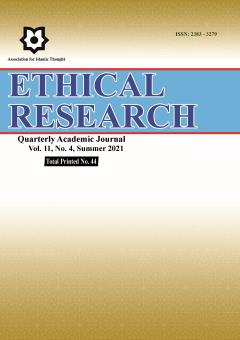Enjoining the good and forbidding the evil in the words of revelation and in the expression of the Prophet and the guardians of God "with a health approach in Islamic life"
Subject Areas : Social ethics and behavioral modeling
1 -
Keywords: Quran, verses, traditions, the commandment of the well-known, the prohibition of evil, the Prophet (peace be upon him), the Imams (pbuh). ,
Abstract :
It is better to speak well than anyone else, but the word of revelation, with its moral and human scent, gives another vitality to the soul and spirit of man. Although our divine word is above the human word, its beautiful manifestation has been crystallized in the words of the great prophets and the pure Imams (as) as the special successors of the last prophet of the order of the Prophet Muhammad (pbuh). Enjoining the good and forbidding the evil are among the certain doctrinal and moral principles among the Islamic sect, and it has its own special place among other religious sects. This common inner desire among human beings indicates the unity of human nature. Benevolence, benevolence, and moral goodness are the scents of fragrance that come from the fragrance of enjoining what is good and forbidding what is evil, and are felt in the breath of healthy human beings. It is on this basis that a person has a desire for good things from within and avoids ugly things. Based on this inner desire, the implementation of enjoining what is good and forbidding what is evil seems to be a necessary and obligatory condition.
قرآن کریم.
آمدی،عبدالواحد،(1411ق)،«غررالحکم و دررالکلم»،مترجم:محمدعلی انصاری،موسسه انتشارات امام عصر(ع)،چاپ اول،تهران.
آیت اله مکارم شیرازی،«تفسیر نمونه»،جلدهای3و2و1،دارالکتب الاسلامیه،چاپ بیست وپنجم،تهران،پاییز 1369،(جلد1،ص:655- جلد2،ص:580- جلد3).
ابن شعبه حرانی، حسن بن علی،«تحف العقول»،انتشارات اسلامیه وابسته به موسسه مدرسین حوزه علمیه قم،چاپ دوم،1404 ق.
الحرالعاملی،الشیخ محمدبن الحسن،(1401 ق)،«وسائل الشیعه»،جلد11،تصحیح وتحقیق: شیخ عبدالرحیم ربانی شیرازی،کتابخانه اسلامی،تهران.
امام خمینی،روح اله،(1372)،«رساله نوین»،ج4،دفترنشرفرهنگ اسلامی،تهران.
امام خمینی،روح اله،«امر به معروف ونهی از منکر»،مؤسسه تنظیم ونشرآثار امام خمینی،تهران،1378.
امام خمینی،روح اله،«کشف الاسرار»،ج3،موسسه نشر آثار امام خمینی (ره)،بی تا.
سبزهای،محمدتقی،«اهمیت وکارکردهای اجتماعی»،تهران،نشر حدید،1375.
طبرسی، شیخ ابوعلی الفضل بن الحسن،«تفسیر مجمع البیان»،ج4،مترجم: دکتر محمد مفتح وحسین نوری، موسسه انتشارات فراهانی،تهران،بی تا.
علامه طباطبایی،سید محمد حسین،«تفسیرالمیزان فی علوم القرآن»،ج 13،مترجم: سیدمحمد باقر همدانی، قم،بنیاد علمی و فکری علامه طباطبایی،1363.
علامه مجلسی،ملا محمدباقر،«بحارالانوار»،موسسه الوفا،(110جلدی) جلدهای25 و100،بیروت،1404 ق
فیض الاسلام، علی النقی،(1351)،«ترجمه نهج البلاغه»، تهران.
کلینی،ابوجعفر محمدبن یعقوب،«اصول کافی»،ج2،دارالأضوا،338ق،بیروت، با تصحیح وتعلیق علی اکبر غفاری،1405ق.
کلینی،ابوجعفر محمدبن یعقوب،«فروع کافی»،ج5،دارالأضوا،338ق،بیروت،با تصحیح وتعلیق علی اکبر غفاری،1405ق.
محدث نوری،میرزا حسین،« مستدرک الوسائل»،ج12،قم،موسسه آل بیت،1408ق.
مسعودی،محمداسحاق،« حریم خصوصی و نظارت اجتماعی»،دفتر نشر معارف،قم،1396.

